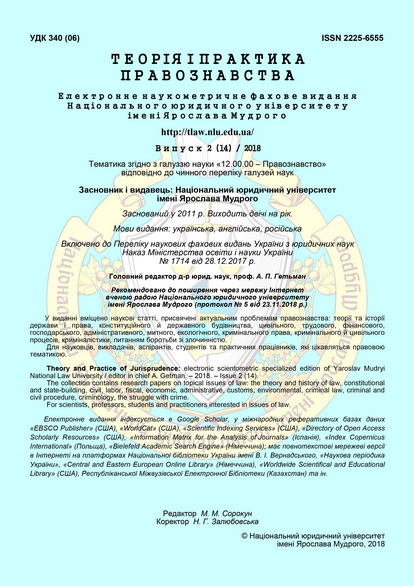Property rights of creditors of a legal entity that is in the process of termination
DOI:
https://doi.org/10.21564/2225-6555.2018.14.149271Keywords:
termination, legal entity, succession, commission, proper fulfillment, ensuringAbstract
The article reveals the problem of protection of the rights of creditors upon termination of a legal entity through its reorganization. Since the contractual relationship is an obligation, the property right of the creditor is the right to demand from the debtor to fulfill the property debt. In the context of the issues discussed in the article, this right has not ‘matured’ yet, that is, the creditor has not yet to make this claim. However, when a legal entity or a court makes a decision on its reorganization, creditors receive additional property rights in comparison with those that they had under the contracts entered into with the legal entity. First of all, it is the right to demand termination or acceleration of obligations, or enforcement of obligations, except in cases stipulated by law. Creditors exercise this right by applying to the Commission for the termination of a legal entity which has to make a final decision on this issue. If the creditor’s property claim was not satisfied by the commission, the obligations legal relationships of this creditor and a newly created in the process of reorganization legal entity are preserved. Meanwhile, if these relationships are, at the request of the creditor, changed by the Commission by ensuring that they are properly implemented, then the legal entity established in the process of reorganization, to which the property that is the subject of the pledge is passed by transfer act or separation balance sheet, will also be the legal successor. The legal entities created in the process of reorganization are jointly and severally liable for the debts of their predecessor, which ensures proper fulfillment of obligations.
References
Diachenko, S.V. (2012). Pravove zabezpechennia prypynennia yurydychnoi osoby. Candidate’s thesis. Kyiv [in Ukrainian].
Zhekov, D.V. (2015). Prypynennia yurydychnykh osib za tsyvilnym zakonodavstvom Ukrainy. Extended abstract of candidate’s thesis. Odesa [in Ukrainian].
Pro derzhavnu reiestratsiiu yurydychnykh osib, fizychnykh osib-pidpryiemtsiv ta hromadskykh formuvan: Zakon Ukrainy vid 15.05.2003 r. № 755-IV. (2003). Vidomosti Verkhovnoi Rady Ukrainy, 31–32, art. 263.
Marits, D.O. (2013). Prekliuzyvni stroky v tsyvilnomu pravi. Derzhava ta rehiony. Seriia: Pravo, 3, 67–71 [in Ukrainian].
Pro vnesennia zmin do deiakykh zakonodavchykh aktiv Ukrainy shchodo osoblyvostei provedennia zakhodiv z finansovoho ozdorovlennia bankiv: Zakon Ukrainy vid 24.07.2009 r. № 1617-VI. (2010). Vidomosti Verkhovnoi Rady Ukrainy, 2–3, art. 11.
Pro vnesennia zmin do deiakykh zakonodavchykh aktiv Ukrainy shchodo vrehuliuvannia vidnosyn mizh kredytoramy ta spozhyvachamy finansovykh posluh: Zakon Ukrainy vid 22.09.2011 r. 3795-VI. (2012). Vidomosti Verkhovnoi Rady Ukrainy, 21, art. 197.
Poiasniuvalna zapyska do proektu Zakonu Ukrainy «Pro vnesennia zmin do deiakykh zakonodavchykh aktiv Ukrainy shchodo vrehuliuvannia vidnosyn mizh kredytoramy ta spozhyvachamy finansovykh posluh». URL: http://w1.c1.rada.gov.ua/pls/zweb2/ webproc4_1?pf3511=38992.
Havryliuk, V. (2013). Mekhanizm zdiisnennia universalnoho pravonastupnytstva pry reorhanizatsii yurydychnykh osib. Visnyk Kyivskoho natsionalnoho universytetu im. T. H. Shevchenka. Yurydychni nauky, 4, 60–64 [in Ukrainian].
Koverzniev, M., Koverznieva, H. (2017). Pravovyi aspekt reorhanizatsii yurydychnykh osib. Pidpryiemnytstvo, hospodarstvo i pravo, 6, 29–31 [in Ukrainian].
Downloads
Published
How to Cite
Issue
Section
License
Copyright (c) 2018 Theory and practice of jurisprudence

This work is licensed under a Creative Commons Attribution 4.0 International License.




